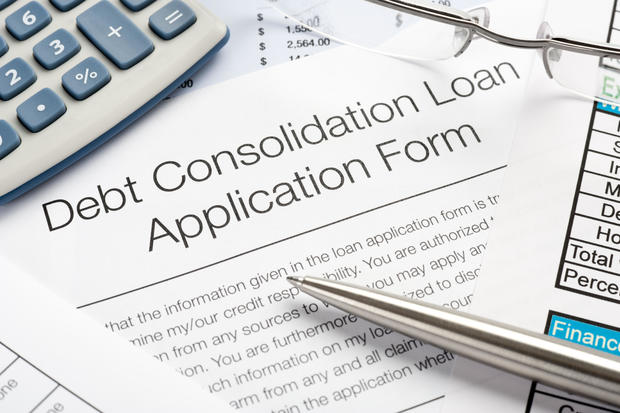Need to consolidate debt? Check out these loan options
We may receive commissions from some links to products on this page. Promotions are subject to availability and retailer terms.
/ Getty Images
Paying off debt can be challenging, especially if you’re juggling multiple debts at once.
Fortunately, consolidating your debts may help ease the process. With debt consolidation, you essentially roll all your balances into a single loan, streamlining your payments and, ideally, reducing your total interest costs, too.
Are you struggling with multiple debts? See if you qualify for a free debt relief consultation using this easy online tool. The entire process takes less than a minute.
If you’re eager to learn more about your debt-relief options, in general, here’s a breakdown.
What is debt consolidation?
Debt consolidation is when you merge all your debts into one single loan.
For example, you take out a loan or line of credit large enough to cover the balances on all your debts. Once approved, you use those funds to pay off your credit cards, loans and other debts in full. You’re then left with just the new loan and one single monthly payment.
Debt consolidation loans can be a good option if you’re dealing with credit card debt – as they often come with lower interest rates. Credit cards typically have double-digit APRs, so consolidating using a loan or other product may be able to save you both monthly and in the long term.
Online resources can be a good place to start when debating what type of debt relief option may work best for your situation. See what option may help you save the most money.
Options for debt consolidation loans
There are several options for consolidating your debt. Some are reserved only for homeowners or those with a mortgage, while others can be used by any consumer.
Here are a few of your options:
-
A personal loan: Personal loans can be an option for debt consolidation, as you can use the funds for any purpose. They may come with higher interest rates than other consolidation options, though. The average rate on personal loans is around 9%, according to the Federal Reserve Bank of St. Louis.
-
A balance transfer credit card: Balance transfer cards are credit cards that typically have a 0% APR between six and 21 months. You transfer all your balances to the card (there’s usually a 3% to 5% fee for this), and then pay off the balance before that zero-rate period expires. According to credit bureau Experian, you typically need at least a 670 credit score or higher to qualify for one of these.
If you’re not sure what your credit score is, you’re not alone. Fortunately, there are some easy ways to find out your credit score using FICO’s online tools.
-
A home equity loan or HELOC: If you own a home, you can use a home equity loan or home equity line of credit (HELOC) to consolidate your debts. These are both second mortgages that allow you to borrow against your home equity. Home equity loans come with an upfront lump sum, while HELOCs work more like credit cards, which you can withdraw from as needed.
-
A cash-out refinance: This is another option for homeowners. To consolidate debt with a cash-out mortgage refinance, you take out a new loan large enough to cover your current balance, plus your other debts. Just remember: There are upfront costs to refinancing. Mortgage purchase Freddie Mac estimates these average around $5,000, though you may be able to roll them into your loan balance and pay them off over time.
Eligibility requirements for each of these options will depend on the lender or credit card company you use. You can expect your credit score to play a role, though (and typically, the higher your score is, the better interest rates you’ll qualify for).
“Generally, you’ll need good credit to qualify for a debt consolidation loan with favorable terms,” says Leslie Tayne, a debt relief attorney in New York. “You may be able to qualify for a high-interest personal loan with marginal credit, but taking out that loan may not improve your financial situation.”
Should you consolidate your debt?
It can be a good idea to consolidate your debt if you’re having trouble keeping track of your payments or you can reduce the total interest you’ll pay in the long term.
Keep in mind that there are risks to taking out any loan or line of credit. With mortgages and home equity products, you’re borrowing against your home. This could put your property at risk of foreclosure if you fail to make payments. Failing to make payments on any loan or credit card will also hurt your credit score, so make sure to only borrow what you need.
You may also want to work on your spending habits to avoid incurring debt again.
As Tayne puts it, “Consolidating your debt won’t fix potentially problematic spending habits. If you tend to spend more money than you make, the chances are good that you’ll rack up a significant amount of credit card debt again – possibly before your consolidation loan is paid off.”

